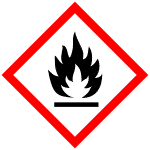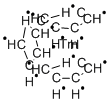三(环戊二烯)铥(III) ,Tris(cyclopentadienyl)thulium ,99.9% trace metals b
产品编号:SIGMA-553980| CAS NO:1272-26-0| 分子式:C15H15Tm| 分子量:364.2138
本网站销售的所有产品仅用于工业应用或者科学研究等非医疗目的,不可用于人类或动物的临床诊断或者治疗,非药用,非食用,
| 产品名称 | 三(环戊二烯)铥(III) |
|---|---|
| 英文名称 | Tris(cyclopentadienyl)thulium |
| CAS编号 | 1272-26-0 |
| 产品熔点 | 248-249ºC (dec.)(lit.) |
| 产品沸点 | 41.5ºC at 760 mmHg |
| 精确质量 | 364.05200 |
| LogP | 3.06450 |
| 蒸气压 | 418mmHg at 25°C |
| 稳定性 | 如果遵照规格使用和储存则不会分解,未有已知危险反应,避免氧化物 |
| 储存条件 | 保持贮藏器密封、储存在阴凉、干燥的地方,确保工作间有良好的通风或排气装置 |
相关文档
化学品安全说明书(MSDS)
下载MSDS质检证书(COA)
相关产品
| 符号 |

GHS02 |
|---|---|
| 信号词 | Danger |
| 危害声明 | H228-H261 |
| 补充危害声明 | Reacts violently with water. |
| 警示性声明 | P210-P231 + P232-P422 |
| 个人防护装备 | Eyeshields;full-face particle respirator type N100 (US);Gloves;respirator cartridge type N100 (US);type P1 (EN143) respirator filter;type P3 (EN 143) respirator cartridges |
| 危害码 (欧洲) | F: Flammable; |
| 风险声明 (欧洲) | R11 |
| 安全声明 (欧洲) | 43-7/8 |
| 危险品运输编码 | UN 3395 4 |
| 包装等级 | III |
| 危险类别 | 4.1 |
|
Section 1: Product Identification Chemical Name:Tris(cyclopentadienyl)thulium(99.9%-Tm) (REO) CAS Registry Number:1272-26-0 Formula:(C5H5)3Tm EINECS Number:215-052-1 Chemical Family:metallocene Synonym:Tris(eta5-2,4-cyclopentadien-1-yl)thulium
Section 2: Composition and Information on Ingredients IngredientCAS NumberPercentACGIH (TWA)OSHA (PEL) Title Compound1272-26-0100%no datano data Section 3: Hazards Identification Emergency Overview:Irritating to the respiratory tract, skin and eyes. May be harmful if swallowed. Primary Routes of Exposure:Ingestion, eyes Eye Contact:Causes slight to mild irritation of the eyes. Skin Contact:Causes slight to mild irritation of the skin. Inhalation:Irritating to skin, eyes and respiratory tract. Ingestion:No information on the effects of ingestion. Acute Health Affects:Irritating to skin, eyes and respiratory tract. Chronic Health Affects:No information available on long-term chronic effects. NTP:No IARC:No OSHA:No SECTION 4: First Aid Measures Immediately flush the eyes with copious amounts of water for at least 10-15 minutes. A victim may need Eye Exposure: assistance in keeping their eye lids open. Get immediate medical attention. Wash the affected area with water. Remove contaminated clothes if necessary. Seek medical assistance if Skin Exposure: irritation persists. Remove the victim to fresh air. Closely monitor the victim for signs of respiratory problems, such as difficulty in Inhalation: breathing, coughing, wheezing or pain. In such cases seek immediate medical assistance. Seek medical attention immediately. Keep the victim calm. Give the victim water (only if conscious). Induce Ingestion: vomiting only if directed by medical personnel. SECTION 5: Fire Fighting Measures Flash Point:none Autoignition Temperature:none Explosion Limits:none Extinguishing Medium:carbon dioxide, foam or dry powder. If this product is involved in a fire, firefighters should be equipped with NIOSH approved positive pressure Special Fire Fighting Procedures: self-contained breathing apparatus and full protective clothing. Hazardous Combustion andIf involved in a fire this material may emit irritating fumes. Decomposion Products: Unusual Fire or Explosion Hazards: No unusual fire or explosion hazards. SECTION 6: Accidental Release Measures Spill and Leak Procedures:Small spills can be mixed with vermiculite or sodium carbonate and swept up. SECTION 7: Handling and Storage Store in a tightly sealed container under an inert atmsphere of nitrogen or argon. Keep in a cool, dry area Handling and Storage: away from heat and direct sunlight. SECTION 8: Exposure Controls and Personal Protection Eye Protection:Always wear approved safety glasses when handling a chemical substance in the laboratory. Skin Protection:Wear appropriate chemical resistant gloves and protective clothing. Ventilation:Material may form a fine dust. If possible, handle the material in an efficient fume hood. If ventilation is not available a respirator should be worn. The use of respirators requires a Respiratory Respirator: Protection Program to be in compliance with 29 CFR 1910.134. Ventilation:Material may form a fine dust. If possible, handle the material in an efficient fume hood. Additional Protection:No additional protection required. SECTION 9: Physical and Chemical Properties Color and Form:yellow solid Molecular Weight:364-22 Melting Point:none Boiling Point:no data Vapor Pressure:no data Specific Gravity:no data Odor:none Solubility in Water:insoluble SECTION 10: Stability and Reactivity Stability:air sensitive, moisture sensitive Hazardous Polymerization:none Conditions to Avoid:exposure to air and moisture Incompatibility:strong oxidizing agents Decomposition Products:carbon dioxide, carbon monoxide, organic fumes and thulium oxide. SECTION 11: Toxicological Information RTECS Data:No information available from RTECS. Carcinogenic Effects:no data available Mutagenic Effects:no data available Tetratogenic Effects:no data available SECTION 12: Ecological Information Ecological Information:No information available SECTION 13: Disposal Considerations Disposal:Dispose of according to local, state and federal regulations. SECTION 14: Transportation Shipping Name (CFR):Non-hazardous Hazard Class (CFR):NA Additional Hazard Class (CFR):NA Packaging Group (CFR):NA UN ID Number (CFR):NA Shipping Name (IATA):Non-hazardous Hazard Class (IATA):NA Additional Hazard Class (IATA):NA Packaging Group (IATA):NA UN ID Number (IATA):NA SECTION 15: Regulatory Information TSCA:Not listed in the TSCA inventory. SARA (Title 313):Title compound not listed. Second Ingredient:none SECTION 16 - ADDITIONAL INFORMATION N/A |








 浙公网安备 33010802013016号
浙公网安备 33010802013016号